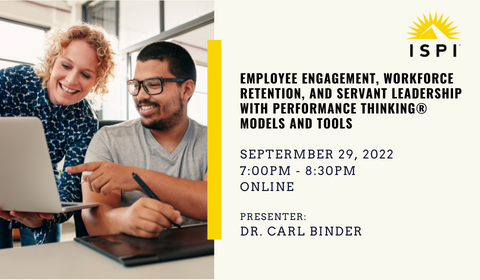Venue: Zoom
-
Employee Engagement, Workforce Retention, and Servant Leadership with Performance Thinking® Models and Tools
September 29, 2022
7:00 pm - 8:30 pm
Registration ends Sept 29, 2022 at Noon
Performance professionals know that we cannot disconnect long-term employee productivity from employee satisfaction and well-being. Accomplishment-based performance improvement, because it focuses on the valuable contributions that individuals, teams, and processes make to their organizations, offers a unique and powerful focus on productivity. The Six Boxes® Model, a plain English descendent of Tom Gilbert’s Behavior Engineering Model, provides a framework for configuring all the factors needed to support productivity and engagement.
In the midst of the Great Resignation leaders and organizations are focused on the challenge of engaging and retaining employees. The well-known Gallup 12 Employee Engagement survey was first created in the 1990s, to assesses factors needed to attract, engage, and retain employees. Researchers have repeatedly conducted analyses to confirm that organizations with survey scores in the top quartile perform significantly better than others with respect to business results such as productivity, customer satisfaction, shrinkage/theft, turnover, absenteeism, safety and quality. These data capture the attention of business executives.
The Gallup 12 survey items are remarkably aligned with the cells of the Six Boxes® Model. Consequently, The Six Boxes Model can serve as a roadmap for optimizing employee engagement and productivity, and as a guide for defining best practices of leaders and managers. Combining an accomplishment-based approach for both business performance and personal development with the Six Boxes Model, leaders and managers have an actionable framework for what has been called Servant Leadership.
Dr. Carl Binder, CEO of The Performance Thinking Network, and long-time ISPI contributor, who has led his colleagues and clients in developing the models and tools of Performance Thinking, will provide an overview of this approach and its models. He’ll describe specific ways to help performance professionals, leaders, and managers engage employees, and collaboratively improve conditions for both productivity, job satisfaction, and continuous development. Leaving time for discussion, he’ll prompt questions and insights about how we performance professionals can help organizations during this critical time.

Presenter: Dr. Carl Binder
Dr. Carl Binder, CEO of The Performance Thinking Network, began his career as a behavior scientist, one of the last graduate students of B.F. Skinner at Harvard University. He spent the 1970s conducting research, training teachers, and consulting to a wide variety of educational and human service organizations with a focus on what has been called fluency-based instruction. Shifting to corporate training and development in 1982, he joined ISPI and met Tom Gilbert, Geary Rummler, Joe Harless, Donald Tosti, Roger Kaufman, and other pioneers in the field of performance improvement, who were generous in their mentorship and support for his development.
Founder of 4 consulting firms, he and his colleagues have continued to refine their methods and models for conducting performance improvement projects, partnering with clients and stakeholders, developing others as performance consultants, and teaching leaders and managers to contribute to continuous performance improvement. Over more than four decades, he has developed what is now known (and first named by his clients) as Performance Thinking®, a flexible but powerful accomplishment-based performance improvement methodology that he and his colleagues train and certify others to apply. It has been adopted by colleagues in the UK, Nigeria, Italy, Sweden, Dubai, Qatar, Poland, Australia, New Zealand, South Korea, and across North America. Carl has published several dozen articles and chapters, presented workshops and presentations every year at ISPI’s conferences since 1987, and been given ISPI’s Thomas F. Gilbert and Honorary Life Member awards, along with the Fred S. Keller Award from the American Psychological Association for his work in education, and the Lifetime Achievement Award from the Organizational Behavior Management Network.
Login to register for the event

